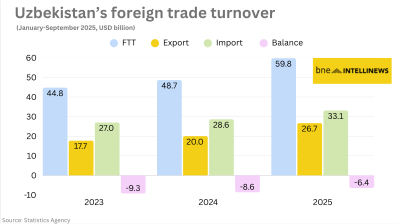“Light at the end of the tunnel” for Turkey’s recession-hit manufacturing sector has been identified in March’s Istanbul Chamber of Industry Turkey Manufacturing Purchasing Managers’ Index (PMI) survey data, consultancy IHS Markit said on April 1.
The headline PMI was recorded at 47.2 in March, up from 46.4 in February and the highest since July 2018. Although 47.2 still denotes contraction (expansion is indicated by any score above 50.0) operating conditions in Turkish industry have now moderated on a monthly basis throughout the past year, and the latest slowdown was weaker than the average over this sequence.
“There appears to be light at the end of the tunnel in the Turkish manufacturing sector, with both output and employment scaled back at the slowest rates since mid-2018. While securing new orders remains a key challenge for firms amid ongoing demand difficulties, the sector in general looks to be moving towards stabilisation,” IHS Markit associate director Andrew Harker said.
Production was scaled back to the least extent in eight months as some panellists who contributed data for the PMI saw demand improve.
Alongside domestic orders, new export orders also eased amid reports of weakness in European demand, following February’s marginal increase. The easing of new business from abroad in March was much weaker than that seen for total new orders.
Below: New Export Orders Index m/m (data contributed for Turkey's March Manufacturing PMI)
Similar to the trend in output, firms scaled back employment to the smallest degree in eight months in March. This came amid some signs of capacity pressures returning as backlogs of work were depleted at the slowest pace since February 2018.
The rate of input cost inflation picked up at the end of the first quarter, with respondents mainly linking the latest rise to weakness in the Turkish lira. But the increase was still much slower than the 2018 average.
A sharper rise in output prices was also recorded as charges increased for the second month running. As with input costs, however, the pace of inflation remained relatively muted.
The PMI is a composite single-figure indicator of manufacturing performance derived from indicators for new orders, output, employment, suppliers’ delivery times and stocks of purchases.
Data

Turkey's central bank remains cautious, delivers 100bp rate cut
Decision comes on eve of next hearing in trial that could dislodge leadership of opposition CHP party.

Polish retail sales return to solid growth in September
Polish retail sales grew 6.4% year on year in constant prices in September, picking up from a 3.1% y/y rise in August, the statistics office GUS said.

Uzbekistan’s nine-month foreign trade nears $60bn
Export growth of 33% and import expansion of 16% y/y produce $6.4bn deficit.

Hungary’s central bank leaves rates unchanged
National Bank of Hungary expects inflation to fall back into the tolerance band by early 2026, with the 3% target sustainably achievable in early 2027 under the current strict policy settings.





